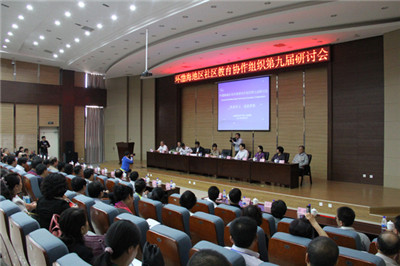 September 24-26, 2014 saw the convening of the Ninth Seminar of Bohai Sea Rim Community Education Cooperation Organization in the City of Dalian, Liaoning Province.
September 24-26, 2014 saw the convening of the Ninth Seminar of Bohai Sea Rim Community Education Cooperation Organization in the City of Dalian, Liaoning Province.
Cai Yan, Deputy Director of the Adult Training Division of the MOE Department of Vocational and Adult Education, attended the seminar. She indicated that China is now at a crucial stage in comprehensively building a moderately prosperous society, which means that continuing education is faced with a rare development opportunity.
Everyone engaged in community education must consider how to seize the opportunity and meet the challenge of community education as a major part of continuing education.
Cai put forward five requirements for how to carry forward the sound and sustainable development of community education. The first is to further improve the three-level institution of community education, to strengthen basic capacity, and to set up provincial and prefectural city community education guidance organizations that will be responsible for the macro coordination of community education planning and development in each area and make community education accessible to ordinary people.
The second is to modernize governing capacity for community education. The main content of this requirement is diversifying the participating parties. It is necessary to improve the multi-party participation mechanism by setting up joint meeting systems, to drive the construction of learning organizations to assist residents in autonomous learning by cultivating learning communities, and to strengthen the government’s services purchasing power, and to encourage the input of private capital in the domain of community education by introducing market mechanisms.
The third is to improve classification guidance to make community education more targeted. The focus of urban community education is to improve quality of life with special attention paid to older adults. In contrast, the focus of rural community education is to provide vocational skills training, serve the transfer of rural labor, and train new vocational farmers.
The fourth is to better coordinate resources to expand the coverage of community education. It is necessary to make better use of the resources of various schools, such as vocational universities and colleges, national open universities (aka radio and television universities), and township adult cultural schools, so as to steadily make community education more accessible.
The fifth and final requirement is to strengthen the connotation construction of community education for reform and innovation. It is necessary to intensify the curriculum system construction of community education and to develop courses suitable for the specific conditions of the local areas. Teaching models should be innovated to encourage autonomous and individual learning as a supplement to conventional lectures and community platforms. At the same time, modern technical means should also be used in teaching to attract more people in community education and lifelong learning. Constant efforts are to be made to explore systems for credit transfer and accumulation.
Cai gave four suggestions to Bohai Sea Rim Community Education Cooperation Organization for their future work. The first is to prepare to undertake the transfer of government functions and to give play to the important role of cooperation organizations in public governance. The second is to actively cooperate with governments and administrative educational authorities at all levels. The third is to continuously study the latest developments in community education theory and to complete theoretical research and practical exploration of community education. The fourth is to strengthen basic capacity building.
Vice President Zhang Zhaowen of the China Adult Education Association gave five suggestions for community education work. The first is to intensify curriculum construction and faculty cultivation. The second is to develop digital learning to make tutorial centres accessible to communities and residents. The third is to tighten up management and standardize statistics to ensure data is as authoritative as possible. The fourth is to increase the content of vocational skills training while paying attention to cultural and recreational activities. The fifth is to ensure good top-level design, to include lifelong education and community education in the supervision of government departments with plans at the beginning of each year, examinations over the course of each year and assessments at the end of each year, and to get more people involved with lifelong and community education. Zhang hopes to see more vocational universities and colleges involved in community education.
The seminar’s attendees included Zhang Qingsheng, Vice president of the National Community Education Committee and Secretary-General of Bohai Sea Rim Community Education Cooperation Organization; Zhang Hua, Deputy Secretary-General of Bohai Sea Rim Community Education Cooperation Organization; Zhang Xuedong, Director of the Section for Vocational and Adult Education with Liaoning Provincial Department of Education; Pan Shijun, Director of the Institute of Lifelong Education with Liaoning Provincial Institute of Education; Zhao Yubao, Deputy Director of Dalian Education Bureau; and Ai Hua, Head of Dalian Ganjingzi District People’s Government. About 80 units and 140 community educational workers from national experimental and demonstration areas of community education, the Community Education Experiment Centre of the Open University of China, and responsible administrative educational departments and community education colleges in the three provinces and two cities of Bohai Sea rim attended the meeting. The MOE Research and Training Centre for Community Education was also invited to the seminar.
The delegates listened to the report “Reflections on Theory and Practice for Lifelong Education, Lifelong Learning and Community Learning within Community Education” given by Professor Gao Zhimin, a doctoral supervisor at East China Normal University; viewed the Exhibition of Residents’ Learning Achievements and Calligraphy and Community Education Painting Exhibition at the Tenth Community Learning Festival of Ganjingzi District; observed a show on achievements in community education in Ganjingzi District; and had exchanges with the Yida Community of Zhouzishui Neighbourhood. The next Seminar of Bohai Sea Rim Community Education Cooperation Organization will be held at the Hebei District Community College of Tianjin Municipality in 2015.

By Meng Jia, Community Education Experiment Centre, the OUC